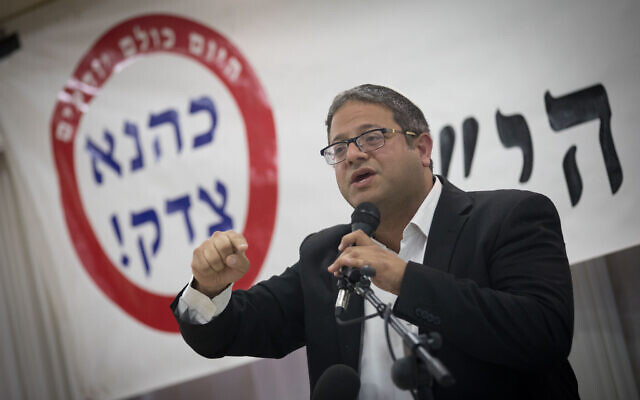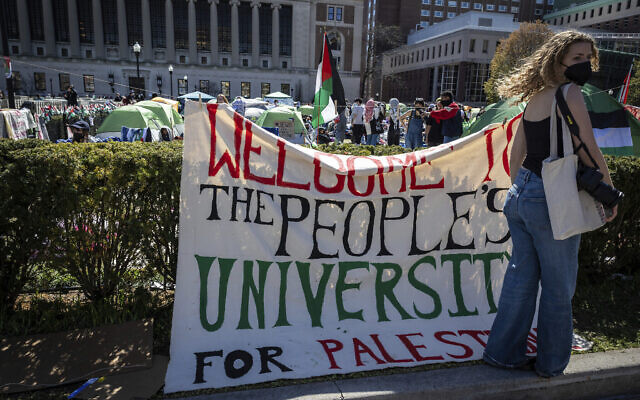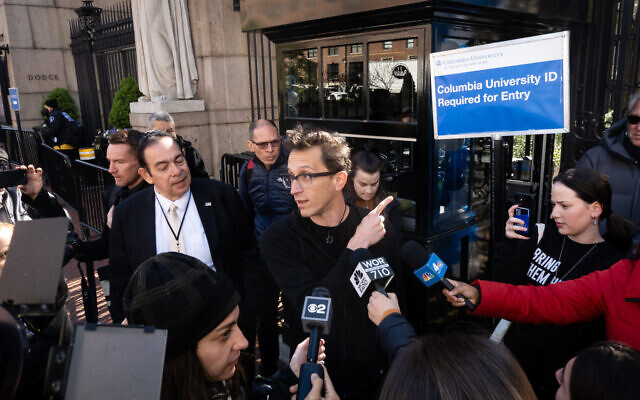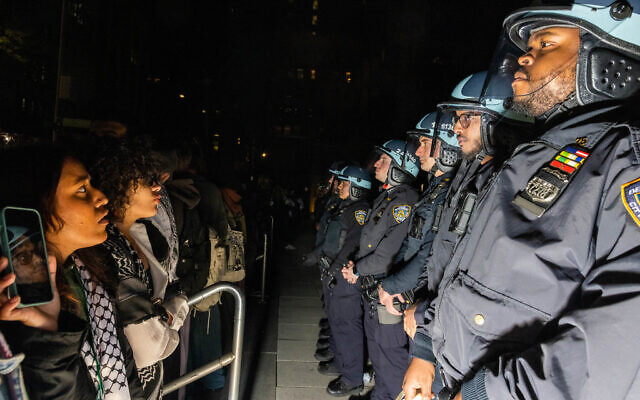Netanyahu says Ben Gvir will be in coalition, but ‘not fit’ to be a minister
Leader of extreme-right Otzma Yehudit party says he won’t be a ‘scarecrow’ in Knesset, wants position of influence to push his plan to encourage Arab emigration

Prime Minister Benjamin Netanyahu said Monday that he wants Itamar Ben Gvir, the leader of the extreme-right Kahanist Otzma Yehudit party, to be a part of his coalition after the March 23 election, but said he “is not fit” to be a member of his cabinet.
In an interview with Channel 12, Netanyahu said that Ben Gvir would not be given a position of influence, including being a minister or heading a Knesset committee.
Netanyahu orchestrated a deal between Ben Gvir and Religious Zionism’s Bezalel Smotrich for a joint run that recent polls have predicted will pass the Knesset electoral threshold. Netanyahu hopes to thus avoid a loss of right-wing votes and bolster his chances of forming a government after the election.
Asked repeatedly why Ben Gvir cannot be a cabinet member if he is good enough to be a part of his coalition, Netanyahu refused to answer. Asked if he believes Ben Gvir, who has called for the expulsion of “disloyal” Arab Israelis, is racist, Netanyahu said: “His positions are not mine.”

But you brokered the alliance that is likely to see Ben Gvir get elected, interviewer Yonit Levy noted. “That’s legitimate?”
“Certainly, I want to bring the votes,” Netanyahu replied.
But he added, “Arab doctors and nurses, Israeli citizens, took care of my parents and my wife’s parents. I won’t forget that… It’s fantastic. We’re changing Israeli society,” he said, claiming recent greater funding and security for Arab Israelis.
In the same interview, Netanyahu predicted a big election victory for his Likud party and its allies, saying he hoped to muster a “real, full” right-wing government.
He also took potshots at one of his main election rivals, Yesh Atid leader Yair Lapid: “I brought millions of vaccines… Four historic agreements… I stand firm against Iran; we’re hitting them on every front…. I’m leading the economy to new heights… What I can do in an hour, Yair Lapid is not capable of doing in a lifetime.”
Netanyahu’s comments on Ben Gvir reinforced a commitment he made last week not to let the Otzma Yehudit leader become a minister.
Ben Gvir, however, has in recent days indicated that if Netanyahu comes to power with his support, he expects an influential position and intends to push forward his plan to encourage some Arab Israelis to emigrate.
“I really respect Netanyahu, but on this, he is mistaken. I don’t plan to be a scarecrow in the Knesset. I want to be in a position of influence,” he told Army Radio on Sunday.
In a separate interview with Srugim, a news site affiliated with the national religious community, Ben Gvir outlined his plans.
“I want to encourage those (Arabs) who throw stones and Molotov cocktails, to encourage them to emigrate from here,” Ben Gvir said. “I think we need an emigration policy will all sorts of incentives. Those who are enemies, who throw stones at soldiers, those who don’t want us here, I will push a program for that.”
He also slightly distanced himself from his mentor, the late racist rabbi Meir Kahane. Kahane’s Kach party was banned from the Knesset in the 1980s — the first instance in Israel of a party being banned for racism.

“Otzma Yehudit (Jewish Power) is not a continuation of the path of Rabbi Kahane,” Ben Gvir said. “Don’t misunderstand me, I think that Rav Kahane was a holy saint, who fought wars for the people of Israel and was killed sanctifying God’s name.”
“But I am not Rav Kahane word for word, I don’t support a law for separate beaches (for Jews and Arabs) and I don’t support including all the Arabs (in the emigration plan),” he said. “I take many good things from Rav Kahane, but I’m not there. I try and forge my own way for the Land of Israel.”
Last week Netanyahu first said Ben Gvir would be in his coalition, but not his government.
In a Channel 20 interview, Netanyahu said, “Ben Gvir made a technical bloc with the Religious Zionism party, so he will plainly be part of the coalition, as [former Otzma Yehudit MK] Michael Ben Ari was.”
Ben Ari, who was part of Netanyahu’s 2009-2013 coalition as a member of the National Union party in which he headed the Otzma faction, was banned from running in the 2019 elections due to racist comments. The Otzma Yehudit leadership was then taken over by Ben Gvir.

Ben Gvir is in the third slot on the merged Religious Zionism Party slate, which most polls in the last few days have shown clearing the Knesset threshold and clinching 4-5 seats in the March 23 elections. To enable to deal to go ahead, Netanyahu also gave the 28th spot on the Likud slate to a candidate from Religious Zionism.
A vote-sharing agreement signed between Likud and Religious Zionism last week allows the parties to ensure that extra votes they win that don’t add up to a Knesset seat do not go to waste. Instead, the combined leftover votes go to the party closest to winning another seat — and are often sufficient to add that seat to its tally, making the votes potentially decisive in a close race.
New elections, the fourth since April 2019, were called in December after the power-sharing government of Likud and Blue and White failed to agree on a budget by a December 23 deadline.
This is not the first time Netanyahu has been behind a deal to bring Otzma Yehudit into the political mainstream.
In February 2019, the prime minister was heavily criticized at home and abroad after engineering a deal for Otzma Yehudit to join two other right-wing factions, a pact that almost saw Ben Gvir enter the Knesset in the April 2019 election.
Before the September 2019 elections, and after failing to convince leaders of the right-wing Yamina party to include Otzma Yehudit in their alliance, Netanyahu waged an aggressive campaign against Otzma Yehudit.
He did the same ahead of the March 2020 elections, after then-Jewish Home chairman Rafi Peretz broke his agreement to run with Otzma Yehudit and agreed to once again merge his faction into Yamina, leaving Ben Gvir out in the cold.
However, Otzma Yehudit refused to drop out of the running in all cases, regularly winning tens of thousands of votes, but not enough to enter parliament. The prime minister has thus previously seen the extremist faction as a spoiler that has repeatedly funneled votes away from other right-wing parties, while ultimately failing to make it into the Knesset.










